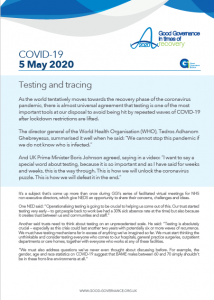Testing and tracing
05 May 2020

As the world tentatively moves towards the recovery phase of the coronavirus pandemic, there is almost universal agreement that testing is one of the most important tools at our disposal to avoid being hit by repeated waves of COVID-19 after lockdown restrictions are lifted.
The director general of the World Health Organisation (WHO), Tedros Adhanom Ghebreyesus, summarised it well when he said: “We cannot stop this pandemic if we do not know who is infected.”
And UK Prime Minister Boris Johnson agreed, saying in a video: “I want to say a special word about testing, because it is so important and as I have said for weeks and weeks, this is the way through. This is how we will unlock the coronavirus puzzle. This is how we will defeat it in the end.”
It’s a subject that’s come up more than once during GGI’s series of facilitated virtual meetings for NHS non-executive directors, which give NEDS an opportunity to share their concerns, challenges and ideas.
One NED said: “Operationalising testing is going to be crucial to helping us come out of this. Our trust started testing very early – to get people back to work (we had a 30% sick absence rate at the time) but also because it creates trust between us and communities and staff.”
Another said trusts need to think about testing on an unprecedented scale. He said: “Testing is absolutely crucial – especially as this crisis could last another two years with potentially six or more waves of recurrence. We must have testing mechanisms far in excess of anything we’ve imagined so far. We must start thinking the unthinkable and consider testing everyone who comes to our hospitals, general practice surgeries, outpatient departments or care homes, together with everyone who works at any of these facilities.
“We must also address questions we’ve never even thought about discussing before. For example, the gender, age and race statistics on COVID-19 suggest that BAME males between 60 and 70 simply shouldn’t be in these front-line environments at all.”
Building resilience
Another NED raised the need to build more resilience into the UK’s pathology services. He said: “We have very good pathology services in the NHS but are they as coordinated as they could be? Pathology networks have been in embryo form for 15 years; we’ve all been slow to embrace the idea because it impinges on trust sovereignty.
“We also need to think about how we’re going to be able to meet the huge increase in demand for testing reagents. The Public Health Laboratory Service once had the capacity to manufacture all the reagents we needed but their resources have been cut back by about 15% over years of austerity so the business has all moved to Germany.
“We need to take a fundamental look at how we organise our pathology services because if we’re going to need to conduct as many tests as some scenarios suggest, I can’t see how we are going to be able to meet the demand.”
Don’t just test – trace
Of course, testing is only part of the solution to COVID-19. Contact tracing is another key factor in limiting the spread of the virus. There are technological solutions to this challenge – the NHS will soon be releasing its own CV19 app, which will enable anyone to report symptoms and order swab tests. But it also logs the distance between the user’s phone and others nearby who also have the app installed. This information will be stored securely on their phone.
If they become unwell, the user can choose to let the app inform the NHS, which triggers an alert to other app users with whom they spent time over the previous few days. Those users will get an alert telling them they have been close to someone with the virus. It may also advise them to self-isolate.
Clever though the app is, there’s no substitute for human contact tracing, where anyone with COVID-19 is referred to a member of a contact tracing team, who will quiz the patient about their movements over the previous days, then contact everyone with whom they’ve had contact and ask them to self-isolate. Health Secretary Matt Hancock has spoken of recruiting 18,000 people to act as contact tracers for the NHS.
Until the arrival of antiretrovirals, the AIDS epidemic in the 1990s was contained through targeted risk-assessment and communications, testing, contact tracing, working with and investing in the communities most affected, and safe sex.
This approach has become the evidence-based means by which epidemics can be controlled. Change safe sex for social distancing and you have the only realistic way of minimising the damage of COVID-19 while a vaccine and treatments are developed.
These are radical, expensive, and some would argue intrusive measures but these are challenging times that call for radical solutions. Boards should be discussing now how to build the resilience back into our system to cope with the challenges of the next phase of this pandemic.
We are keen to hear your views. If this briefing prompts any questions or comments, please call us on 07732 681120 or email us at advice@good-governance.org.uk. We will aim to respond within 24 hours.

